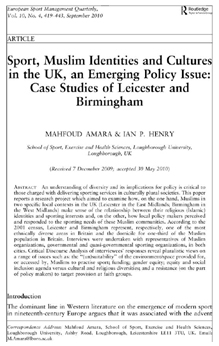
Author: Mahfoud Amara and Ian Henry
Publisher: Institute of Sport Policy and Management, University of Loughborough
Release Date: 30 March 2010
Pages: 419-443
Source: https://core.ac.uk/download/pdf/42479640.pdf
Britain’s hosting of the 2012 Olympics has pushed sports up the national agenda, with numerous initiatives underway at schools and colleges to establish a mood of national celebration and participation. This University of Loughborough study is thus opportune in considering access to facilities within Muslim communities in Birmingham and Leicester. The first two chapters of the report are of a theoretical nature, reviewing the sociological literature on themes such as integration, otherness, types of Muslim identity and multiculturalism. A subsequent chapter, ‘Investigating Modern Sport in/and Islam, and Sport in Muslim Contexts’ identifies the ideological and value-laden underpinnings of ‘western’ sport – and includes the interesting quote “arguments around the deification of sport stars have transformed sport to a new religion with its own proclaimed ‘demi-gods’, ‘temples’ and prophets” – taken from W. Baker’s ‘If Christ came to the Olympics’. A significant proportion of the report – 54 out of 128 pages – comprises extracts from interviews with Muslim community organisations’ representatives and officials of local government and quasi-governmental bodies.
The authors cite a finding from Birmingham City Council in 2003 indicating that the BME communities participated less in sports than other city groups: “under a third used a leisure centre/pool/club/gym in the last twelve months, compared to 42.7 % of the overall city population. The proportion drops to 12.7 % for those of Bangladeshi heritage”. This lack of take-up of facilities is even more disturbing when considering the much higher proportion of young people in the Bangladeshi community (and the Muslim population in general) in comparison with the rest of the population.
This is not to say that Muslim organizations are indifferent to the problem: the report identifies twenty-two community associations in Birmingham and Leicester, including two mosques, offering sports activities to men and in some cases to women as well. However with a population base of at least 600,000 in these two cities, this is utterly inadequate. A number of interviewees point the way forward for Muslims to benefit from mainstream sports facilities: “integration of Muslims into local and national initiatives” and “the lack of understanding in terms of what Muslim woman requires”. The report comments on the lack of female representation in the organizations participating in the study.
The authors’ interviews with policy makers and service providers – for example local authorities, county sports partnerships and Sport England – indicate an acknowledgment of the need for equity policies in sport, but there is “a lack of practical action”. They note that policy documents such as the Sports Equity Index “made no mention of religion or faith groups, and did not articulate how inequity experienced by religious/faith groups was to be addressed. Similarly, the Equality Standard in Sport England (2007) makes “no mention of religious differences as being a dimension to which policy actions will be addressed. The document simply outlines ‘race specific duties’, and is silent on how these duties might entail engagement with faith groups”.
The public expenditure cuts will inevitably affect sports funding, and lead to greater expectations from central and local government for community bodies to provide facilities and services.
The report has been funded by the British Academy. The project director is the Algerian academic Dr. Mahfoud Amara, lecturer in Sport and Leisure Policy and Management at Loughborough University since 2004; the report is co-authored with Professor Ian Henry.
